X
the episode of the game of poker
'Seymour,' my brother-in-law said, with a deep-drawn sigh, as we left Lake George next day by the Rennselaer and Saratoga Railroad, 'no more Peter Porter for me, if you please! I'm sick of disguises. Now that we know Colonel Clay is here in America, they serve no good purpose; so I may as well receive the social consideration and proper respect to which my rank and position naturally entitle me.'
'And which they secure for the most part (except from hotel clerks), even in this republican land,' I answered briskly.
For in my humble opinion, for sound copper-bottomed snobbery, registered A1 at Lloyd's, give me the free-born American citizen.
We travelled through the States, accordingly, for the next four months, from Maine to California, and from Oregon to Florida, under our own true names, 'Confirming the churches,' as Charles facetiously put it—or in other words, looking into the management and control of railways, syndicates, mines, and cattle-ranches. We inquired about everything. And the result of our investigations appeared to be, as Charles further remarked, that the Sabeans who so troubled the sons of Job seemed to have migrated in a body to Kansas and Nebraska, and that several thousand head of cattle seemed mysteriously to vanish, à la Colonel Clay, into the pure air of the prairies just before each branding.
However, we were fortunate in avoiding the incursions of the Colonel himself, who must have migrated meanwhile on some enchanted carpet to other happy hunting-grounds.
It was chill October before we found ourselves safe back in New York, en route for England. So long a term of freedom from the Colonel's depredations (as Charles fondly imagined—but I will not anticipate) had done my brother-in-law's health and spirits a world of good; he was so lively and cheerful that he began to fancy his tormentor must have succumbed to yellow fever, then raging in New Orleans, or eaten himself ill, as we nearly did ourselves, on a generous mixture of clam-chowder, terrapin, soft-shelled crabs, Jersey peaches, canvas-backed ducks, Catawba wine, winter cherries, brandy cocktails, strawberry-shortcake, ice-creams, corn-dodger, and a judicious brew commonly known as a Colorado corpse-reviver. However that may be, Charles returned to New York in excellent trim; and, dreading in that great city the wiles of his antagonist, he cheerfully accepted the invitation of his brother millionaire, Senator Wrengold of Nevada, to spend a few days before sailing in the Senator's magnificent and newly-finished palace at the upper end of Fifth Avenue.
'There, at least, I shall be safe, Sey,' he said to me plaintively, with a weary smile. 'Wrengold, at any rate, won't try to take me in—except, of course, in the regular way of business.'
Boss-Nugget Hall (as it is popularly christened) is perhaps the handsomest brown stone mansion in the Richardsonian style on all Fifth Avenue. We spent a delightful week there. The lines had fallen to us in pleasant places. On the night we arrived Wrengold gave a small bachelor party in our honour. He knew Sir Charles was travelling without Lady Vandrift, and rightly judged he would prefer on his first night an informal party, with cards and cigars, instead of being bothered with the charming, but still somewhat hampering addition of female society.
The guests that evening were no more than seven, all told, ourselves included—making up, Wrengold said, that perfect number, an octave. He was a nouveau riche himself—the newest of the new—commonly known in exclusive old-fashioned New York society as the Gilded Squatter; for he 'struck his reef' no more than ten years ago; and he was therefore doubly anxious, after the American style, to be 'just dizzy with culture.' In his capacity of Mæcenas, he had invited amongst others the latest of English literary arrivals in New York—Mr. Algernon Coleyard, the famous poet, and leader of the Briar-rose school of West-country fiction.
'You know him in London, of course?' he observed to Charles, with a smile, as we waited dinner for our guests.
'No,' Charles answered stolidly. 'I have not had that honour. We move, you see, in different circles.'
I observed by a curious shade which passed over Senator Wrengold's face that he quite misapprehended my brother-in-law's meaning. Charles wished to convey, of course, that Mr. Coleyard belonged to a mere literary and Bohemian set in London, while he himself moved on a more exalted plane of peers and politicians. But the Senator, better accustomed to the new-rich point of view, understood Charles to mean that he had not the entrée of that distinguished coterie in which Mr. Coleyard posed as a shining luminary. Which naturally made him rate even higher than before his literary acquisition.
At two minutes past the hour the poet entered. Even if we had not been already familiar with his portrait at all ages in The Strand Magazine, we should have recognised him at once for a genuine bard by his impassioned eyes, his delicate mouth, the artistic twirl of one gray lock upon his expansive brow, the grizzled moustache that gave point and force to the genial smile, and the two white rows of perfect teeth behind it. Most of our fellow-guests had met Coleyard before at a reception given by the Lotus Club that afternoon, for the bard had reached New York but the previous evening; so Charles and I were the only visitors who remained to be introduced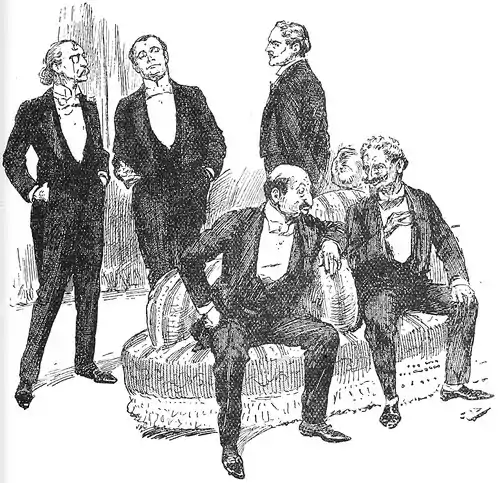
The lion of the hour. to him. The lion of the hour was attired in ordinary evening dress, with no foppery of any kind, but he wore in his buttonhole a dainty blue flower whose name I do not know; and as he bowed distantly to Charles, whom he surveyed through his eyeglass, the gleam of a big diamond in the middle of his shirt-front betrayed the fact that the Briar-rose school, as it was called (from his famous epic), had at least succeeded in making money out of poetry. He explained to us a little later, in fact, that he was over in New York to look after his royalties. 'The beggars,' he said, 'only gave me eight hundred pounds on my last volume. I couldn't stand that, you know; for a modern bard, moving with the age, can only sing when duly wound up; so I've run across to investigate. Put a penny in the slot, don't you see, and the poet will pipe for you.'
'Exactly like myself,' Charles said, finding a point in common. 'I'm interested in mines; and I, too, have come over to look after my royalties.'
The poet placed his eyeglass in his eye once more, and surveyed Charles deliberately from head to foot. 'Oh,' he murmured slowly. He said not a word more; but somehow, everybody felt that Charles was demolished. I saw that Wrengold, when we went in to dinner, hastily altered the cards that marked their places. He had evidently put Charles at first to sit next the poet; he varied that arrangement now, setting Algernon Coleyard between a railway king and a magazine editor. I have seldom seen my respected brother-in-law so completely silenced.
The poet's conduct during dinner was most peculiar. He kept quoting poetry at inopportune moments.
'Roast lamb or boiled turkey, sir?' said the footman.
'Mary had a little lamb,' said the poet. 'I shall imitate Mary.'
Charles and the Senator thought the remark undignified.
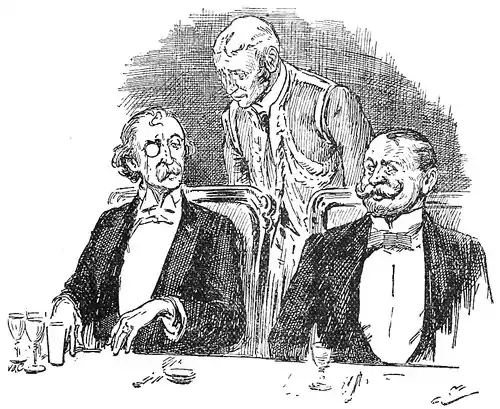
I shall imitate Mary.
After dinner, however, under the mellowing influence of some excellent Roederer, Charles began to expand again, and grew lively and anecdotal. The poet had made us all laugh not a little with various capital stories of London literary society—at least two of them, I think, new ones; and Charles was moved by generous emulation to contribute his own share to the amusement of the company. He was in excellent cue. He is not often brilliant; but when he chooses, he has a certain dry vein of caustic humour which is decidedly funny, though not perhaps strictly without being vulgar. On this particular night, then, warmed with the admirable Wrengold champagne—the best made in America—he launched out into a full and embroidered description of the various ways in which Colonel Clay had deceived him. I will not say that he narrated them in full with the same frankness and accuracy that I have shown in these pages; he suppressed not a few of the most amusing details—on no other ground, apparently, than because they happened to tell against himself; and he enlarged a good deal on the surprising cleverness with which several times he had nearly secured his man; but still, making all allowances for native vanity in concealment and addition, he was distinctly funny—he represented the matter for once in its ludicrous rather than in its disastrous aspect. He observed also, looking around the table, that after all he had lost less by Colonel Clay in four years of persecution than he often lost by one injudicious move in a single day on the London Stock Exchange; while he seemed to imply to the solid men of New York, that he would cheerfully sacrifice such a fleabite as that, in return for the amusement and excitement of the chase which the Colonel had afforded him.
The poet was pleased. 'You are a man of spirit, Sir Charles,' he said. 'I love to see this fine old English admiration of pluck and adventure! The fellow must really have some good in him, after all. I should like to take notes of a few of those stories; they would supply nice material for basing a romance upon.'
'I hardly know whether I'm exactly the man to make the hero of a novel,' Charles murmured, with complacence. And he certainly didn't look it.
'I was thinking rather of Colonel Clay as the hero,' the poet responded coldly.
'Ah, that's the way with you men of letters,' Charles answered, growing warm. 'You always have a sneaking sympathy with the rascals.'
'That may be better,' Coleyard retorted, in an icy voice, 'than sympathy with the worst forms of Stock Exchange speculation.'
The company smiled uneasily. The railway king wriggled. Wrengold tried to change the subject hastily. But Charles would not be put down.
'You must hear the end, though,' he said. 'That’s not quite the worst. The meanest thing about the man is that he's also a hypocrite. He wrote me such a letter at the end of his last trick—here, positively here, in America.' And he proceeded to give his own version of the Quackenboss incident, enlivened with sundry imaginative bursts of pure Vandrift fancy.
When Charles spoke of Mrs. Quackenboss the poet smiled. 'The worst of married women,' he said, 'is—that you can't marry them; the worst of unmarried women is—that they want to marry you.' But when it came to the letter, the poet's eye was upon my brother-in-law. Charles, I must fain admit, garbled the document sadly. Still, even so, some gleam of good feeling remained in its sentences. But Charles ended all by saying, 'So, to crown his misdemeanours, the rascal shows himself a whining cur and a disgusting Pharisee.'
'Don't you think,' the poet interposed, in his cultivated drawl, 'he may have really meant it? Why should not some grain of compunction have stirred his soul still?—some remnant of conscience made him shrink from betraying a man who confided in him? I have an idea, myself, that even the worst of rogues have always some good in them. I notice they often succeed to the end in retaining the affection and fidelity of women.'
'Oh, I said so!' Charles sneered. 'I told you you literary men have always an underhand regard for a scoundrel.'
'Perhaps so,' the poet answered. 'For we are all of us human. Let him that is without sin among us cast the first stone.' And then he relapsed into moody silence.
We rose from table. Cigars went round. We adjourned to the smoking-room. It was a Moorish marvel, with Oriental hangings. There, Senator Wrengold and Charles exchanged reminiscences of bonanzas and ranches and other exciting postprandial topics; while the magazine editor cut in now and again with a pertinent inquiry or a quaint and sarcastic parallel instance. It was clear he had an eye to future copy. Only Algernon Coleyard 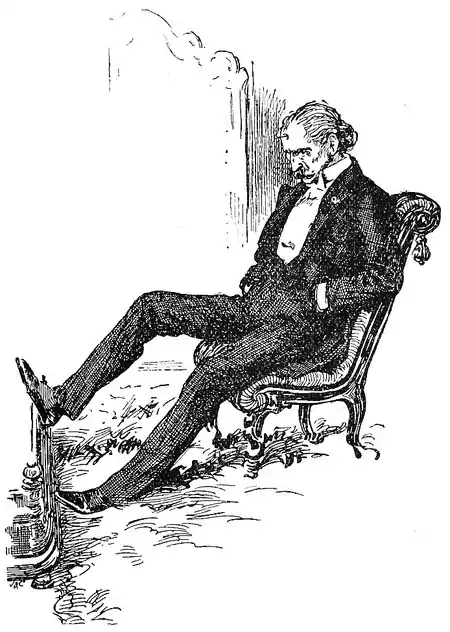
Moody. sat brooding and silent, with his chin on one hand, and his brow intent, musing and gazing at the embers in the fireplace. The hand, by the way, was remarkable for a curious, antique-looking ring, apparently of Egyptian or Etruscan workmanship, with a projecting gem of several large facets. Once only, in the midst of a game of whist, he broke out with a single comment.
'Hawkins was made an earl,' said Charles, speaking of some London acquaintance.
'What for?' asked the Senator.
'Successful adulteration,' said the poet tartly.
'Honours are easy,' the magazine editor put in.
'And two by tricks to Sir Charles,' the poet added.
Towards the close of the evening, however—the poet still remaining moody, not to say positively grumpy—Senator Wrengold proposed a friendly game of Swedish poker. It was the latest fashionable variant in Western society on the old gambling round, and few of us knew it, save the omniscient poet and the magazine editor. It turned out afterwards that Wrengold proposed that particular game because he had heard Coleyard observe at the Lotus Club the same afternoon that it was a favourite amusement of his. Now, however, for a while he objected to playing. He was a poor man, he said, and the rest were all rich; why should he throw away the value of a dozen golden sonnets just to add one more pinnacle to the gilded roofs of a millionaire's palace? Besides, he was half-way through with an ode he was inditing to Republican simplicity. The pristine austerity of a democratic senatorial cottage had naturally inspired him with memories of Dentatus, the Fabii, Camillus. But Wrengold, dimly aware he was being made fun of somehow, insisted that the poet must take a hand with the financiers. 'You can pass, you know,' he said, 'as often as you like; and you can stake low, or go it blind, according as you’re inclined to. It's a democratic game; every man decides for himself how high he will play, except the banker; and you needn't take bank unless you want it.'
'Oh, if you insist upon it,' Coleyard drawled out, with languid reluctance, 'I'll play, of course. I won't spoil your evening. But remember, I'm a poet; I have strange inspirations.'
The cards were 'squeezers'—that is to say, had the suit and the number of pips in each printed small in the corner, as well as over the face, for ease of reference. We played low at first. The poet seldom staked; and when he did—a few pounds—he lost, with singular persistence. He wanted to play for doubloons or sequins, and could with difficulty be induced to condescend to dollars. Charles looked across at him at last; the stakes by that time were fast rising higher, and we played for ready money. Notes lay thick on the green cloth. 'Well,' he murmured provokingly, 'how about your inspiration? Has Apollo deserted you?'
It was an unwonted flight of classical allusion for Charles, and I confess it astonished me. (I discovered afterwards he had cribbed it from a review in that evening's Critic.) But the poet smiled.
'No,' he answered calmly, 'I am waiting for one now. When it comes, you may be sure you shall have the benefit of it.'
Next round, Charles dealing and banking, the poet staked on his card, unseen as usual. He staked like a gentleman. To our immense astonishment he pulled out a roll of notes, and remarked, in a quiet tone, 'I have an inspiration now. Half-hearted will do. I go five thousand.' That was dollars, of course; but it amounted to a thousand pounds in English money—high play for an author.
Charles smiled and turned his card. The poet turned his—and won a thousand.
'Good shot!' Charles murmured, pretending not to mind, though he detests losing.
'Inspiration!' the poet mused, and looked once more abstracted.
Charles dealt again. The poet watched the deal with boiled-fishy eyes. His thoughts were far away. His lips moved audibly. 'Myrtle, and kirtle, and hurtle,' he muttered. 'They'll do for three. Then there's turtle, meaning dove; and that finishes the possible. Laurel and coral make a very bad rhyme. Try myrtle; don't you think so?'
'Do you stake?' Charles asked, severely, interrupting his reverie.
The poet started. 'No, pass,' he replied, looking down at his card, and subsided into muttering. We caught a tremor of his lips again, and heard something like this: 'Not less but more republican than thou, Half-hearted watcher by the Western sea, After long years I come to visit thee, And test thy fealty to that maiden vow, That bound thee in thy budding prime For Freedom's bride———'
'Stake?' Charles interrupted, inquiringly, again.
'Yes, five thousand,' the poet answered dreamily, pushing forward his pile of notes, and never ceasing from his murmur: 'For Freedom's bride to all succeeding time. Succeeding; succeeding; weak word, succeeding. Couldn't go five dollars on it.'
Charles turned his card once more. The poet had won again. Charles passed over his notes. The poet raked them in with a far-away air, as one who looks at infinity, and asked if he could borrow a pencil and paper. He had a few priceless lines to set down which might otherwise escape him.
'This is play,' Charles said pointedly. 'Will you kindly attend to one thing or the other?'
The poet glanced at him with a compassionate smile. 'I told you I had inspirations,' he said. 'They always come together. I can't win your money as fast as I would like, unless at the same time I am making verses. Whenever I hit upon a good epithet, I back my luck, don't you see? I won a thousand on Half-hearted, and a thousand on budding; if I were to back succeeding, I should lose, to a certainty. You understand my system?'
'I call it pure rubbish,' Charles answered. 'However, continue. Systems were made for fools—and to suit wise men. Sooner or later you must lose at such a stupid fancy.'
The poet continued. 'For Freedom's bride to all ensuing time.'
'Stake!' Charles cried sharply. We each of us staked.
'Ensuing,' the poet murmured. 'To all ensuing time. First-rate epithet that. I go ten thousand, Sir Charles, on ensuing.'
We all turned up. Some of us lost, some won; but the poet had secured his two thousand sterling.
'I haven't that amount about me,' Charles said, in that austerely nettled voice which he always assumes when he loses at cards; 'but—I'll settle it with you to-morrow.'
'Another round?' the host asked, beaming.
'No, thank you,' Charles answered; 'Mr. Coleyard's inspirations come too pat for my taste. His luck beats mine. I retire from the game, Senator.'
Just at that moment a servant entered, bearing a salver, with a small note in an envelope. 'For Mr. Coleyard,' he observed; 'and the messenger said, urgent.'
Coleyard tore it open hurriedly. I could see he was agitated. His face grew white at once.
'I—I beg your pardon,' he said. 'I—I must go back instantly. My wife is dangerously ill—quite a sudden attack. Forgive me, Senator. Sir Charles, you shall have your revenge to-morrow.'
It was clear that his voice faltered. We felt at least he was a man of feeling. He was obviously frightened. His coolness forsook him. He shook hands as in a dream, and rushed downstairs for his dust-coat. Almost as he closed the front door, a new guest entered, just missing him in the vestibule.
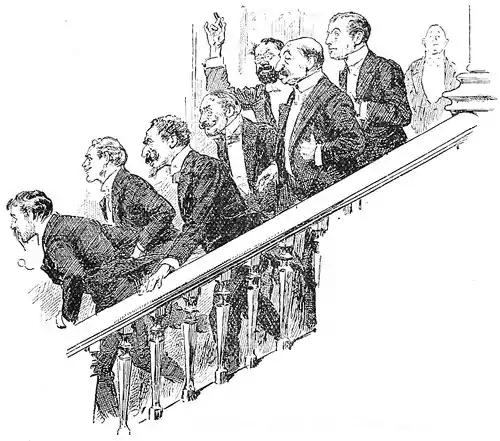
We burst down the stairs in a body.
'Halloa, you men,' he said, 'we've been taken in, do you know? It's all over the Lotus. The man we made an honorary member of the club to-day is not Algernon Coleyard. He's a blatant impostor. There's a telegram come in on the tape to-night saying Algernon Coleyard is dangerously ill at his home in England.'
Charles gasped a violent gasp. 'Colonel Clay!' he shouted, aloud. 'And once more he's done me. There's not a moment to lose. After him, gentlemen! after him!'
Never before in our lives had we had such a close shave of catching and fixing the redoubtable swindler. We burst down the stairs in a body, and rushed out into Fifth Avenue. The pretended poet had only a hundred yards' start of us, and he saw he was discovered. But he was an excellent runner. So was I, weight for age; and I dashed wildly after him. He turned round a corner; it proved to lead nowhere, and lost him time. He darted back again, madly. Delighted with the idea that I was capturing so famous a criminal, I redoubled my efforts—and came up with him, panting. He was wearing a light dust-coat. I seized it in my hands. 'I've got you at last!' I cried; 'Colonel Clay, I've got you!'
He turned and looked at me. 'Ha, old Ten Per Cent!' he called out, struggling. 'It's you, then, is it? Never, never to you, sir!' And as he spoke, he somehow flung his arms straight out behind him, and let the dust-coat slip off, which it easily did, the sleeves being new and smoothly silk-lined. The suddenness of the movement threw me completely off my guard, and off my legs as well. I was clinging to the coat and holding him. As the support gave way I rolled over backward, in the mud of the street, and hurt my back seriously. As for Colonel Clay, with a nervous laugh, he bolted off at full speed in his evening coat, and vanished round a corner.
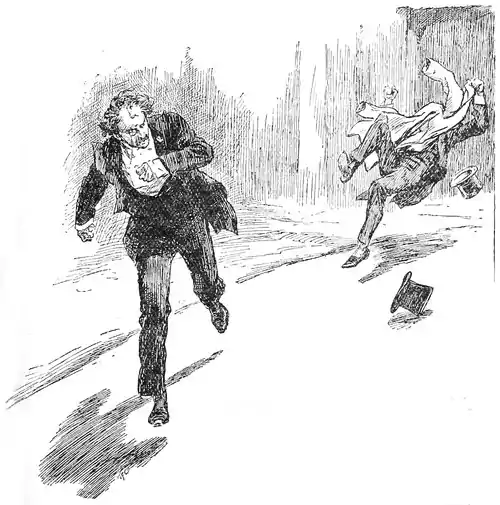
I rolled backward.
It was some seconds before I had sufficiently recovered my breath to pick myself up again, and examine my bruises. By this time Charles and the other pursuers had come up, and I explained my condition to them. Instead of commending me for my zeal in his cause—which had cost me a barked arm and a good evening suit—my brother-in-law remarked, with an unfeeling sneer, that when I had so nearly caught my man I might as well have held him.
'I have his coat, at least,' I said. 'That may afford us a clue.' And I limped back with it in my hands, feeling horribly bruised and a good deal shaken.
When we came to examine the coat, however, it bore no maker's name; the strap at the back, where the tailor proclaims with pride his handicraft, had been carefully ripped off, and its place was taken by a tag of plain black tape without inscription of any sort. We searched the breast-pocket. A handkerchief, similarly nameless, but of finest cambric. The side-pockets—ha, what was this? I drew a piece of paper out in triumph. It was a note—a real find—the one which the servant had handed to our friend just before at the Senator's.
We read it through breathlessly:—
'Darling Paul,—I told you it was too dangerous. You should have listened to me. You ought never to have imitated any real person. I happened to glance at the hotel tape just now, to see the quotations for Cloetedorps to-day, and what do you think I read as part of the latest telegram from England? "Mr. Algernon Coleyard, the famous poet, is lying on his death-bed at his home in Devonshire." By this time all New York knows. Don't stop one minute. Say I'm dangerously ill, and come away at once. Don't return to the hotel. I am removing our things. Meet me at Mary's. Your devoted,Margot.'
'This is very important,' Charles said. 'This does give us a clue. We know two things now: his real name is Paul—whatever else it may be, and Madame Picardet's is Margot.'
I searched the pocket again, and pulled out a ring. Evidently he had thrust these two things there when he saw me pursuing him, and had forgotten or neglected them in the heat of the mêlée.
I looked at it close. It was the very ring I had noticed on his finger while he was playing Swedish poker. It had a large compound gem in the centre, set with many facets, and rising like a pyramid to a point in the middle. There were eight faces in all, some of them composed of emerald, amethyst, or turquoise. But one face—the one that turned at a direct angle towards the wearer's eye—was not a gem at all, but an extremely tiny convex mirror. In a moment I spotted the trick. He held this hand carelessly on the table while my brother-in-law dealt; and when he saw that the suit and number of his own card mirrored in it by means of the squeezers were better than Charles's, he had 'an inspiration,' and backed his luck—or rather his knowledge—with perfect confidence. I did not doubt, either, that his odd-looking eyeglass was a powerful magnifier which helped him in the trick. Still, we tried another deal, by way of experiment—I wearing the ring; and even with the naked eye I was able to distinguish in every case the suit and pips of the card that was dealt me.
'Why, that was almost dishonest,' the Senator said, drawing back. He wished to show us that even far-Western speculators drew a line somewhere.
'Yes,' the magazine editor echoed. 'To back your skill is legal; to back your luck is foolish; to back your knowledge is———'
'Immoral,' I suggested.
'Very good business,' said the magazine editor.
'It's a simple trick,' Charles interposed. 'I should have spotted it if it had been done by any other fellow. But his patter about inspiration put me clean off the track. That's the rascal's dodge. He plays the regular conjurer's game of distracting your attention from the real point at issue—so well that you never find out what he’s really about till he's sold you irretrievably.'
We set the New York police upon the trail of the Colonel; but of course he had vanished at once, as usual, into the thin smoke of Manhattan. Not a sign could we find of him. 'Mary's,' we found an insufficient address.
We waited on in New York for a whole fortnight. Nothing came of it. We never found 'Mary's.' The only token of Colonel Clay's presence vouchsafed us in the city was one of his customary insulting notes. It was conceived as follows:—
'O Eternal Gullible!—Since I saw you on Lake George, I have run back to London, and promptly come out again. I had business to transact there, indeed, which I have now completed; the excessive attentions of the English police sent me once more, like great Orion, 'sloping slowly to the west.' I returned to America in order to see whether or not you were still impenitent. On the day of my arrival I happened to meet Senator Wrengold, and accepted his kind invitation solely that I might see how far my last communication had had a proper effect upon you. As I found you quite obdurate, and as you furthermore persisted in misunderstanding my motives, I determined to read you one more small lesson. It nearly failed; and I confess the accident has affected my nerves a little. I am now about to retire from business altogether, and settle down for life at my place in Surrey. I mean to try just one more small coup; and, when that is finished, Colonel Clay will hang up his sword, like Cincinnatus, and take to farming. You need no longer fear me. I have realised enough to secure me for life a modest competence; and as I am not possessed like yourself with an immoderate greed of gain, I recognise that good citizenship demands of me now an early retirement in favour of some younger and more deserving rascal. I shall always look back with pleasure upon our agreeable adventures together; and as you hold my dust-coat, together with a ring and letter to which I attach importance, I consider we are quits, and I shall withdraw with dignity. Your sincere well-wisher,Cuthbert Clay, Poet.''Just like him!' Charles said, 'to hold this one last coup over my head in terrorem. Though even when he has played it, why should I trust his word? A scamp like that may say it, of course, on purpose to disarm me.'
For my own part, I quite agreed with 'Margot.' When the Colonel was reduced to dressing the part of a known personage I felt he had reached almost his last card, and would be well advised to retire into Surrey.
But the magazine editor summed up all in a word. 'Don't believe that nonsense about fortunes being made by industry and ability,' he said. 'In life, as at cards, two things go to produce success—the first is chance; the second is cheating.'